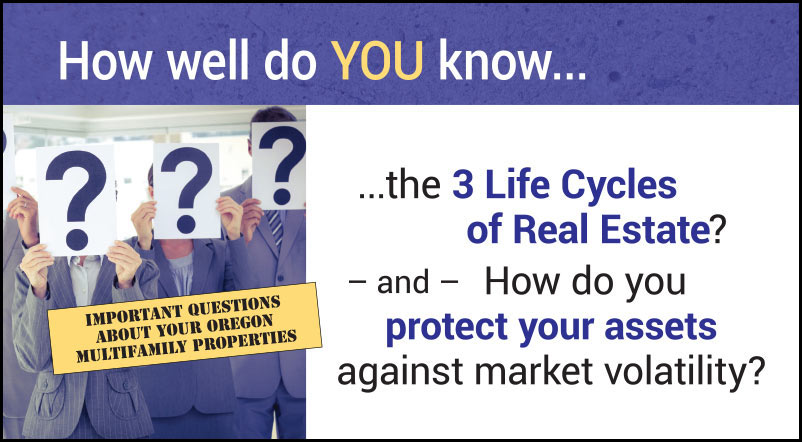
Where’s Your Property In The Real Estate Life Cycle?
We know multifamily and part of that is knowing where properties are in their life cycle. We know that’s an important part of how the investment is managed. Not knowing this puts you at a disadvantage to more successful investors.
Read or Click to Listen
Today we’re talking with René Nelson, CCIM, a well known multifamily expert and commercial real estate broker, about commercial real estate in Eugene. This special series focuses on issues related to multifamily properties that many investors aren’t as familiar with as they should be.
René, what are the three life cycles of real estate?
René: Well, I tell you what Patrick, this is my favorite topic. I am passionate about this because this is where we see a lot of multifamily owners make some big mistakes.
First cycle is the life cycle of ownership. I see people [inaudible 00:00:37] having to sell when they have not thought out a plan and they don’t know an alternative, and it puts them into a hardship because they might have a partner that now wants to bail out on them, and either have to go take on more debt or they have to sell the property. Now they’re forced to pay a tax consequence or figure out if they want to go in to a 1031 Exchange with this other partner. Most of them, if they’re trying to separate their partnerships, they’re just trying to get away from each other. Death, divorce, different things create issues there with partnerships. But the first one is the life cycle of an ownership entity.
The second one is the life cycle of the asset. Mismanaging credit loss, vacancy and repair, I see lots of owners who try to eke out every dollar in rent and they’re slow to put money back into their properties for updating or remodeling. That catches up with them in the end when they try to sell that property because they’re going to see a definite hit in the sales price compared to other properties that maybe a 1970s 40-unit apartment complex. But if they haven’t put money into it, they’re going to see that in the bottom line when they go to sell.
Then the third one is the life cycle of the market. Mistiming cap rates and value trends in the market. If you’re unfamiliar with any of these three cycles, it can cost you a lot of money. We just see people misguide themselves and misjudge what they should do and then in the end, it winds up costing them quite a bit in value.
René, how do you know where your property is in the three life cycles of real estate?
René: Well, as an example if you have a partner, do you have a written by-out plan? Do they have to give you X-number of months of advanced notice so that you can come up with a plan on how you’re going to buy them out? Or if you plan to leave your real estate portfolio to your kids, do they understand what you’re passing on to them? Because a lot of people build a portfolio and they’re going to leave it to their heirs, but their heirs really are not in tune with the real estate portfolio and how to handle it.
The life cycle of the asset, have you factored in, what I call Cap-X, in repairs? Roof, HVAC system, new carpet, new finishes, you need to factor all that in. And there’s three things that I tell my clients to look at: What will it cost you? How long will it take? Because you’re going to be losing rent while it sits vacant and the handyman or the contractor does the repairs. Then how how do you do this with tenants in place? Because you don’t want to have your whole building vacant all at the same time.
This process just requires a conceptual plan for the rehab. Then planning how are you going to implement, then staging with the leasing, and making the improvements to each of those units. But on the flipside, if you put about $5,000 of renovation in to each unit, you’ll typically see a minimum of $20,000 in increase in capitalization right off the bat. It’s definitely worth it to upgrade the units because you’re going to see increased rents, tenants are going to stay longer, and then that adds right to your bottom line with you go to sell it because your property is updated and in a good situation.
Thank you, René. Now our listeners know what’s new with commercial real estate in Eugene right now. If you need more information, go to eugene-commercial.com, or call René at 541-912-6583.

Recent Comments